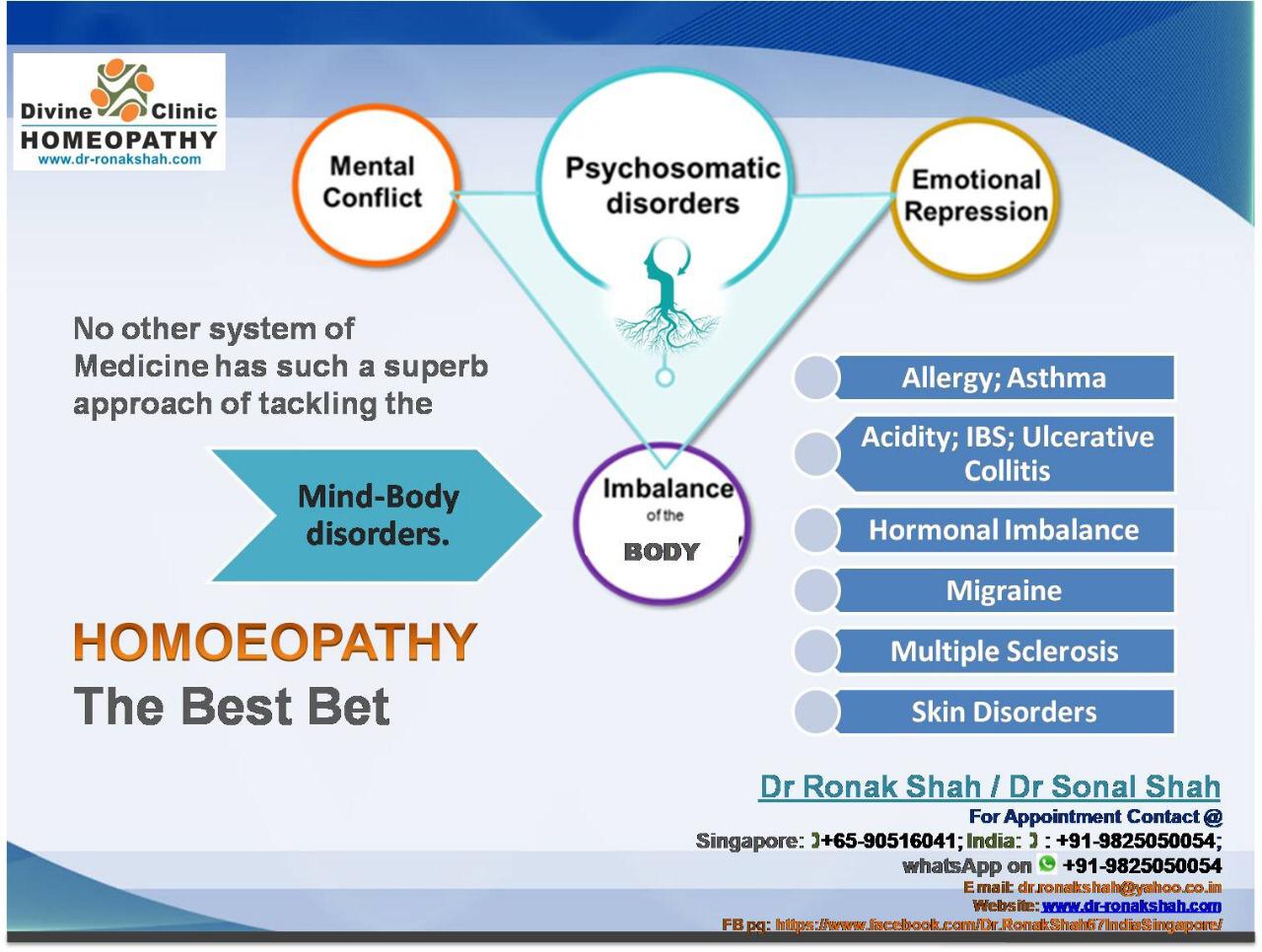
Homoeopathy:
Excellent for Psychosomatic Disorders.
The psychosomatic disorders like Migraine, Asthma, Acidity, Irritable Bowel Syndrome, Peptic ulcer, Ulcerative colitis, Chronic Skin Disorders, Multiple Sclerosis & Hormonal Imbalance etc. are successfully treated with homeopathy. Homeopathy has long recognised the psychological origin of somatic (body) symptoms.
Homeopathy always examines patient’s mental make-up in all cases and remedies are given acting at the level of mind and body together, thus eradicating the disease. Perhaps no other system of medicine has such a superb approach of tackling the mind-body disorders with definite therapeutic agents.
Homeopathic remedies are capable of influencing the state of mind. They can specifically act to alleviate emotional disturbance such as excessive anxiety, irritability, insecurity, obsessive traits, undue jealousy, suspicion (paranoid) fears, depression, neurosis etc. By relieving the emotions such as above, homeopathic remedies bring about harmonious state of health. Thus homeopathy demonstrates the possibility of the highest goal of medicine, the therapy for the person rather than for the disease alone. Homoeopathic remedies can cure mental & emotional disturbed states.
Psychosomatic means mind (psyche) and body (soma). A psychosomatic disorder is a disease which involves both mind and body. Some physical diseases are thought to be particularly prone to be made worse by mental factors such as stress and anxiety. Your current mental state can affect how bad a physical disease is at any given time.
Which diseases are psychosomatic?
• To an extent, most diseases are psychosomatic - involving both mind and body.
• There is a mental aspect to every physical disease. How we react to disease and how we cope with disease vary greatly from person to person. For example, the rash of psoriasis may not bother some people very much. However, the rash covering the same parts of the body in someone else may make them feel depressed and more ill.
There can be physical effects from mental illness. For example, with some mental illnesses you may not eat, or take care of yourself, very well which can cause physical problems.
However, the term psychosomatic disorder is mainly used to mean ... "a physical disease that is thought to be caused, or made worse, by mental factors".
How can the mind affect physical diseases?
It is well known that the mind can cause physical symptoms. For example, when we are afraid or anxious we may develop:
• A fast heart rate.
• A 'thumping heart' (palpitations).
• Feeling sick (nauseated).
• Shaking (tremor).
• Sweating.
• Dry mouth.
• Chest pain.
• Headaches.
• A knot in the stomach.
• Fast breathing.
These physical symptoms are due to increased activity of nervous impulses sent from the brain to various parts of the body and to the release of adrenaline (epinephrine) into the bloodstream when we are anxious.
However, the exact way that the mind can cause certain other symptoms is not clear. Also, how the mind can affect actual physical diseases (rashes, blood pressure, etc) is not clear. It may have something to do with nervous impulses going to the body, which we do not fully understand. There is also some evidence that the brain may be able to affect certain cells of the immune system, which is involved in various physical diseases.
How To Treat Psychosomatic Disorder
1. Yoga
2. Medication- Homeopathy
3. Fasting Therapy
4. Hypnosis
5. Cognitive Behavior Therapy (Psychological Counselling)
Relax and Get Relief from Psychosomatic Disorders with these.
Your state of mind is what aggravates or calms your physical condition. Hence, psychology plays an important part in curing a disease and even during the onset of disease in the first place. So, the next time you get unnecessarily stressed, remember that stress and anxiety can lead to something more dangerous than a temporary feeling of anger, depression, or frustration. Keeping stress and anxiety at bay are the key goals.